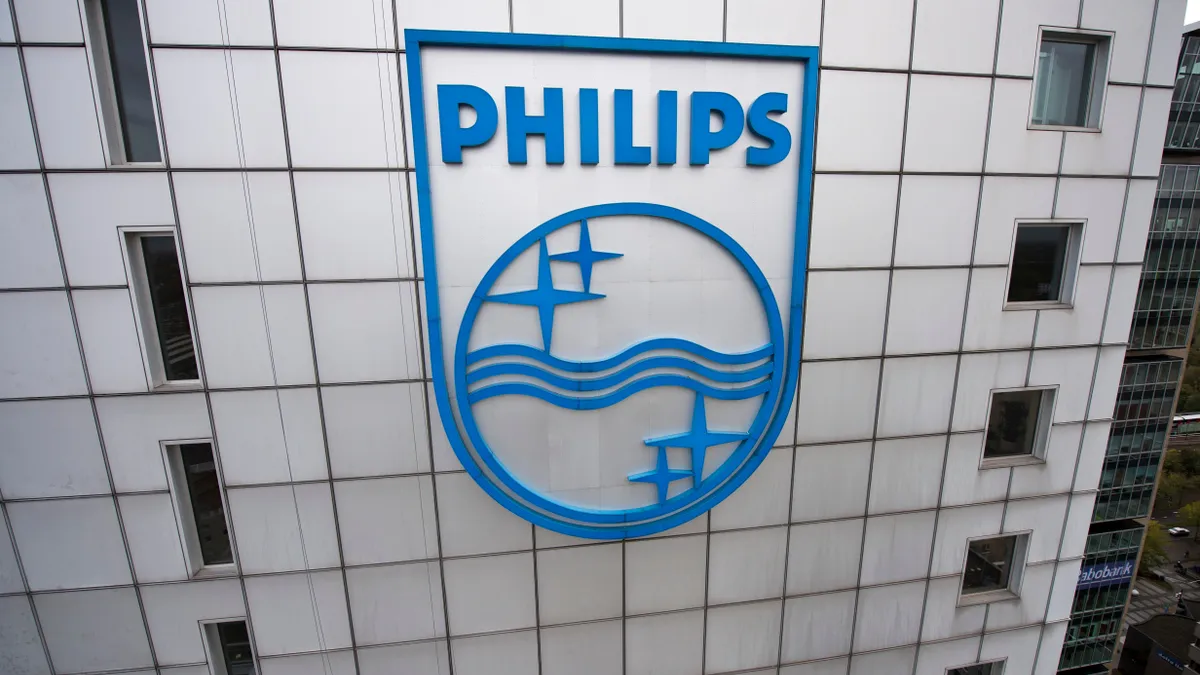Dive Brief:
- In an update released Friday to Philips Respironics' June 14 recall of ventilators, continuous positive airway pressure and bi-level positive airway pressure machines, FDA said it is asking the company to retain an independent laboratory to perform additional testing on the silicone-based foam in its replacement devices. However, the agency said it does not have enough information to determine whether the material poses a risk to patients and does not recommend that patients who have received devices with silicone-based foam stop using them.
- The request for more testing to assess health risks comes after FDA learned while inspecting a Philips manufacturing facility that the silicone-based foam used in a similar device sold outside of the U.S. failed a safety test for the release of acceptable levels of certain volatile organic compounds.
- Philips, in a press release, said it will work closely with FDA to clarify and follow up on the inspection findings and the agency's request for comprehensive testing. The company's stock price was down 11% before the market opened Monday.
Dive Insight:
FDA's request for further testing of the replacement sound abatement foam threatens to snarl Philips' efforts to rebound from the recall and regain market share. "We believe that the need for additional testing could slow Philips Respironics' effort to repair or replace its recalled units," Needham analysts said in a note to clients.
Civil and personal injury claims filed against Philips over the recall of more than 3 million sleep apnea devices are weighing on the company. A repair and replacement program is underway following the June recall, which was initiated due to health risks associated with polyester-based polyurethane foam in the devices that can break down and cause potentially life-threatening injury to patients or permanent impairment.
Philips said in a FAQ document that it expects no delay to the replacement process due to FDA's announcement. However, William Blair analysts in a Monday note believe that while the outcome of additional testing "may find the replacement silicone foam as safe and as such not impactful to the market," they contend the update "adds some risk to the timing to resolve the ongoing recall, whether domestically or internationally."
FDA said it approved Philips' plan to replace the foam in the devices based partly on testing the company conducted on the new silicone-based material. Discontinuing use of the devices, the agency said, could be more harmful to a patient's health and quality of life.
"Ensuring patients and providers have the most up-to-date information regarding the recall of these critical devices is a top priority for the FDA," Jeff Shuren, director of FDA's Center for Devices and Radiological Health, said in a statement. "We recognize that patients rely on these devices, and we are closely monitoring the company's actions to ensure that the issues are resolved in a timely manner given the impact on patients."
FDA provided a list of its investigator's inspection observations to the company and has not made a final determination as to whether the company has violated any regulations, the agency said, adding that it will review the company's response and all information available to determine next steps.
Shuren said FDA was committed to providing regular updates to the public on the status of the recall, "including any new recommendations or actions regarding Philips Respironics' devices."
Philips said in a statement it would submit its response to the inspection findings to FDA for review. The company said it plans to make more data available to regulatory authorities as soon as possible after completion of its assessment on the PE-PUR foam, which is expected to be in the fourth quarter. Testing on the silicone foam that Philips provided to FDA on devices authorized for marketing in the U.S. had demonstrated acceptable results, the company added.
"We remain fully committed to supporting the community of patients who rely on the affected devices, and the physicians and customers who are dedicated to meeting patient needs," Philips CEO Frans van Houten said.
Van Houten last month told investors the company anticipates strong growth in the second half of 2022 as it rebuilds its market share in the sleep business, an assertion that has met with skepticism from analysts.
The CEO of rival sleep apnea device maker ResMed has said his company is seeing "extremely high" demand for its products and could get a boost to sales of as much as $350 million over 12 months due to the Philips recall. However, supply chain challenges affecting the entire economy could slow or lessen that growth potential.
William Blair analysts projected in a recent report that the recall will add about $85 million of revenue in the first quarter of 2022, $75 million in both the second and third quarter and $90 million in the fourth quarter. ResMed's stock price was up over 5% Monday morning before the market opened.
Needham analysts said further delay in moving past the recall could allow ResMed to capture additional market share and keep a greater portion of it over time. Analysts at Jefferies said that while FDA's update is "not positive" for sentiment toward Philips' shares, the market is already discounting a recovery in the Dutch company's sleep business.










